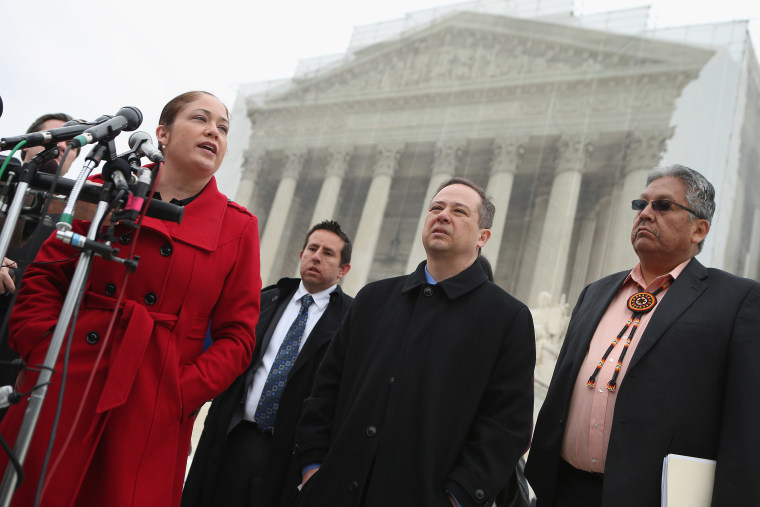Voting-rights advocates are expressing confidence that the Supreme Court will reject an Arizona law that requires people to show proof of citizenship when registering to vote, in a case that could have major implications for the federal government's ability to protect the right to vote.
Lawyers challenging the law argued before the Supreme Court Monday that Proposition 200, passed in 2004, violates the 1993 National Voter Registration Act, known as Motor Voter, which was aimed at simplifying and boosting voter registration. The Motor Voter law already requires voters to attest, under penalty of perjury, that they’re citizens, but does not require them to provide documentation. By requiring election administrators to reject forms that aren't accompanied by proof of citizenship, voting-rights groups argue, Prop 200 runs directly into the Motor Voter law. When state and federal law conflict, federal law takes precedence.
"It appeared that a majority of justices, based on their questions, were agreeable to that argument," Jon Greenbaum, of the Lawyers Committee for Civil Rights Under Law, told reporters Monday afternoon, in response to a question from msnbc.
Arizona argues that the proof of citizenship requirement is not unduly burdensome, and doesn’t violate Motor Voter. A U.S. appeals court last summer found for the law’s opponents.
Last month, another voting-rights case that went before the Supreme Court—concerning the constitutionality of a key part of the Voting Rights Act—received widespread coverage. The Arizona case has flown largely under the radar, but the stakes are high. Election-law expert Rick Hasen, a law professor at the University of California, Irvine, wrote Saturday that a ruling by the court to uphold Arizona’s law “would alter the state-federal balance over federal elections and give states a greater ability to manipulate election rules for partisan reason," and suggested this could be the “sleeper case of the year.”
Despite Greenbaum's confidence, in oral arguments Monday morning the justices appeared sharply divided on the case. As expected, Justice Sonia Sotomayor, a member of the court's liberal wing, sounded skeptical about the legitimacy of Prop 200.
“Many people don’t have the documents that Arizona requires,” she said at one point. And at another, she declared: “I have a huge difficulty—great difficulty” with the claim that requiring proof of citizenship would not be unduly burdensome.
But equally expected, Justice Antonin Scalia, a standard-bearer for the conservative bloc, seemed supportive of the measure. At one point he even asked Arizona Attorney General Tom Horne why the state did not challenge the original Motor Voter form for not requiring proof of citizenship.
And the court's most frequent swing voter, Justice Anthony Kennedy, did not tip his hand. At one point he said that if a state can add additional requirement on top of the Motor Voter form, then that form "is not worth very much." Later, though, he added that states have a "vital interest" in federal elections.
Allowing the law to stand would threaten voting rights in two major, related ways, those challenging the measure argue. First, as Hasen suggested, it would set a precedent that would give states more leeway to evade federal mandates aimed at making elections fairer and more efficiently run.
"It would open the floodgates to other states being able to attach their own requirements" to voter registrations forms, Nina Perales of the Mexican-American Legal Defense and Education Fund (MALDEF), which filed the original challenge against the law, told reporters. Perales said that age, mental capacity, and criminal records could theoretically become criteria for states to use if the law is upheld.
Second, it would make it much harder for organizations that conduct voter registration drives to do their work effectively—both in Arizona and in any other states that might now try to pass similar measures. Elizabeth MacNamara , the president of the League of Women Voters, explained to msnbc that her group generally seeks out unregistered voters in malls, community centers, and other public locations—not places where people tend to carry around their birth certificate or passport. That means that if they don’t happen to have a driver’s license—as many students and lower-income Americans don’t—they’re out of luck under Prop 200.
"A lot of folks are not in a position to prove they’re a citizen out there in the community in order to be able to register,” MacNamara said.
In Arizona’s largest county, Maricopa, voter registration through community drives dropped by 44% in the two and a half years after Prop 200 was implemented, according to court documents filed by MALDEF. “It really does impair our ability to reach the people we really want to reach and to make sure every eligible voter has got the same access to registration that every other voter does,” MacNamara added.
That’s a big deal, because hampering registration drives ultimately does much more to restrict voting than some other measures, like voter ID laws, that have gotten more attention lately. In 2008—even after an unprecedented registration drive by the Obama campaign and affiliated groups—just 71% of eligible voters were registered. And the number of eligible, but unregistered, voters is significantly higher for lower-income and less educated Americans—groups typically targeted by voting drives.
The challenge to the law isn’t about racial discrimination. Arizona is covered under Section 5 of the Voting Rights Act, and the law was cleared by the Justice Department as not having a discriminatory impact.
But some voting-rights advocates nevertheless maintain that Prop 200 is an effort to disempower Latinos, who are more likely than whites to be unable to document their citizenship.
“What concerns us most is that many states are following a growing trend of voting practices that target Latinos—such as use of the Department of Homeland Security’s SAVE data—and subjects them to greater obligations of proof of their citizenship,” Penda Hair, the co-director of the Advancement Project, said in a statement. “The court needs to recognize that this must cease if we are to ensure that elections in our country are free, fair and accessible for all eligible voters.”
